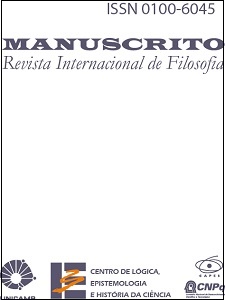Resumo
Some arguments use ‘generic’, or ‘typical’, objects. An explanation for (some aspects of) this idea in terms of ‘almost all’ is suggested. The intuition of ‘almost all’ as ‘but for a few exceptions’ is rendered precise by means of ultrafilters. A logical system, with generalized quantifiers for ‘almost all’, is proposed as a basis for generic reasoning. This logic is monotonic, has a simple sound and complete deductive calculus, and is a conservative extension of classical first-order logic, with which it shares several properties. For generic reasoning, generic individuals are introduced and internalized as generic constants, thereby producing conservative extensions where one can reason about generic objects as intended. A many-sorted version of this logic is introduced to handle distinct notions of ‘large’ subsets. Other possible applications for this logic are indicated.
Referências
ANTONIOU, G. (1997). Nonmonotonic Reasoning (Cambridge, Mass., MIT Press).
BARWISE, J. (ed.). (1977). Handbook of Mathematical Logic (Amsterdam, North-Holland). BARWISE, J. & FEFERMAN, S. (eds.) (1985). Model-Theoretic Logics (Berlin, Springer-Verlag).
BELL, J. L. & SLOMSON, A B. (1971). Models and Ultraproducts: an introduction (Amsterdam, North-Holland).
BESNARD, P. (1989). An Introduction to Default Logic (Berlin, Springer- Verlag).
BESNARD, P., BREWKA, G., FROIDEVAUX, C., GRÉGOIRE, E. & SIEGEL, P. (1991). “Nonmonotonicity”, Journal Applied Non- Classical Logics 1(2), pp. 267-310.
BREWKA, G. (1991). Nonmonotonic Reasoning: logical foundations of commonsense. (Cambridge, Cambridge University Press).
BIRKHOFF, G. & LIPSON, J. D. (1970). “Heterogeneous algebras”, J. Combin. Th., ser. A 8, pp. 115-133.
CARNIELLI, W. A. & SETTE, A. M. (1994). Default operators, (Abstr.) Workshop on Logic, Language, Information and Computation, Recife, Brazil.
CARNIELLI, W. A. & VELOSO, P. A. S. (1997). “Ultrafilter logic and generic reasoning”. In Gottlob, G., Leitsch, A. and Mundici, D. (eds.) Computational Logic and Proof Theory (5th Kurt Gödel Colloquium: KGC’97) {LNCS 1289} (Berlin, Springer-Verlag), pp. 34-53.
CHANG, C. C. & KEISLER, H. J. (1973). Model Theory (Amsterdam, North-Holland).
CHURCH, A. (1956). Introduction to Mathematical Logic, vol. I. (Princeton, NJ, Princeton University Press).
ENDERTON, H. B. (1972). A Mathematical Introduction to Logic (New York, Academic Press). FLUM, J. (1985). “Characterizing logics”. In: Barwise and Feferman (eds.) (1985), p. 77-120.
FREGE, G. (1879). Begriffsschrift, eine der arithmetischen nachgebildete Formelsprache des reines Denken. Louis Nebert, Halle {English translation in van Heijenoort, J. (ed.) From Frege to Gödel (Cambridge, Mass., Harvard University Press),}.
GÄRDENFORS, P. (1988). Knowledge in Flux: modelling the dynamics of epistemic states (Cambridge, Mass., MIT Press).
GOLDBLATT, R. (1979). Topoi: the Categorial Analysis of Logic (Amsterdam, North-Holland).
GRÁCIO, M.C.G. (1999). Lógicas Moduladas e Raciocínio sob Incerteza.Ph. D. Dissertation, UNICAMP, Campinas.
HALMOS, P. R. (1972). Lectures on Boolean Algebras (London, van Nostrand Reinhold).
HEMPEL, C. (1965). Aspects of Scientific Explanation and Other Essays in the Philosophy of Science (New York, Free Press).
HENKIN, L. (1949). “The completeness of the first-order functional calculus”, Journal of Symbolic Logic 14, pp. 159-166.
KEISLER, H. J. (1970). “Logic with the quantifier ‘there exist uncountably many’”, Annals of Math. Logic 1, pp. 1-93.
LINDSTRÖM, P. (1966). “On extensions of elementary logic”, Theoria 35, pp. 1-11.
LUKAZIEWICZ, W. (1990). Non-monotonic Reasoning: formalization of commonsense reasoning (Chichester, Ellis Horwood). MACLANE, S. (1971). Categories for the Working Mathematician (Berlin, Springer-Verlag).
MAKINSON, D. and GÄRDENFORS, P. (1991). “Relations between the logic of theory change and non-monotonic logic”. In: Fuhrmann, A. and Morreau, M. (eds.) The Logic of Theory Change {LNAI} (Berlin, Springer-Verlag).
MAREK, V.W. and TRUSZCZYNSKI, M. (1993). Nonmonotonic Logic: context-dependent reasoning (Berlin, Springer-Verlag).
MERÉ, M.C. & VELOSO, P.A.S. (1992). “On extensions by sorts” (Rio de Janeiro, PUC-Rio, Dept. Informática, Res. Rept. MCC 38/92).
———. (1995). “Definition-like extensions by sorts”, Bull. IGPL 3(4), pp. 579-595.
REITER, R. (1980). “A logic for default reasoning”, J. Artificial Intelligence 13(1), pp. 81-132.
RENTERÍA, C. J., HAEUSLER, E. H. & VELOSO, P. A. S. (2002). “NUL: dedução natural para lógica de ultrafiltros” (Rio de Janeiro, PUC-Rio, Dept. Informática, Res. Rept. MCC 16/02).
SCHLECHTA, K. (1995). “Defaults as generalized quantifiers”, Journal Logic and Computation 5(4), pp. 473-494.
SETTE, A. M., CARNIELLI, W. A. & VELOSO, P. A. S. (1999). “An alternative view of default reasoning and its logic”. In: Haeusler, E.H. and Pereira, L.C. (eds.) Pratica: Proofs, Types and Categories (Rio de Janeiro, PUC-Rio), pp. 127-158.
TARSKI, A. (1930). “Fundamentale Begriffe der Methodologie der deduktiven Wissenschaften”. Monatshefte für Mathematik und Physik 37, pp. 361-404 {English translation in Tarski (1956), pp. 60-109}.
———. (1936). “Der Wahrheitsbegiff in den formalisierten Sprachen”. Studia für Mathematik und Philosophia 1, pp. 261-405 {English translation in Tarski (1956), pp. 152-278}.
———. (1956). Logic, Semantics and Metamathematics: papers from 1923 to 1938. Woodger, J. H. (transl.) (Oxford, Clarendon).
TURNER, W. (1984). Logics for Artificial Intelligence (Chichester Ellis Horwood).
VELOSO, P. A. S. (1999). “On ultrafilter logic and a missing axiom”, Bull. Sect. Logic, 28(1), pp. 17-26.
VELOSO, P. A. S & CARNIELLI, W. A (1997). “An ultrafilter logic for generic reasoning and some applications”. (Rio de Janeiro,
COPPE-UFRJ, Progr. Eng, Sist. Comput., Res. Rept. ES-437/97).
———. (2001). “Logics for qualitative reasoning”. CLE e-Prints 1{http://www.cle.unicamp.br/e-prints}.

